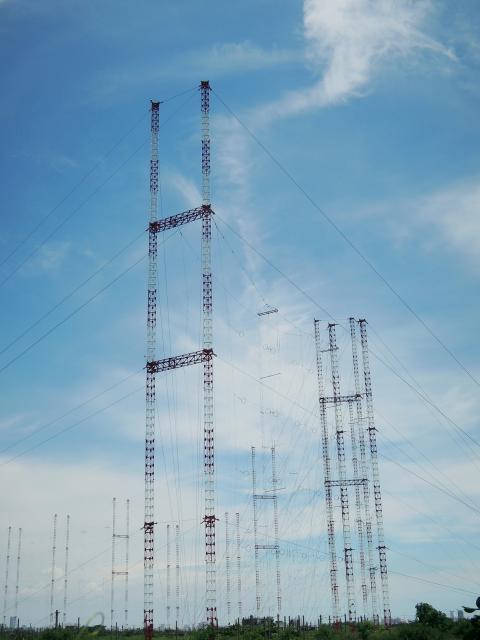Three US congressional members have written to President Ma Ying-jeou (馬英九) to protest plans to tear down two shortwave radio towers in Yunlin County’s Huwei Township (虎尾) and in Greater Tainan.
They say the towers — at least partly built with US funds — may still be needed to broadcast uncensored news into China.
The towers are being used by Falun Gong and its media organization, the Sound of Hope Radio Network, to transmit broadcasts that are critical of the Chinese government and its human rights record.

Photo: Taipei Times
A statement issued by Falun Gong in Washington on Monday said that Radio Taiwan International (RTI) had already begun tearing down the towers in Greater Tainan and that requests from the US Congress to stop the demolition were being ignored.
The statement said that Beijing was putting “huge pressure” on Taiwan to stop shortwave broadcasts aimed at China.
It said that RTI had changed its mission from spreading “freedom and democracy to China” to marketing and promoting Taiwan.
The statement said the towers were built in the 1960s and 1970s, several with funding from the US military.
“RTI plans to close two major radio facilities, Huwei and Tainan substations,” it said.
It said the two radio stations had 28 shortwave radio towers equipped with antennae with a transmission power of at least 2,700 kilowatts and could cover all of China.
“The Chinese Communist Party is very scared about the power of these towers and they want the towers to be demolished,” the statement signed by Sound of Hope Radio Network president Allen Zeng said.
“Any plan to tear down these facilities is premature and should be suspended pending analysis of other potential use of the facilities,” US Representative Frank Wolf wrote in a letter to Ma.
“Any demolitions that would reduce the capability to transmit into China should be halted until alternatives can be fully explored,” US Representative Dana Rohrabacher wrote in another letter to Ma.
US Representative Christopher Smith has also written to the president to express his concern that “any teardown would undermine the purpose for which these facilities were built” and would deprive US broadcasters of a chance to save expenses.
“I believe that any plan to tear down the Tainan and Huwei facilities should be delayed until their strategic utilization by international shortwave broadcasters is fully studied,” Smith said.
RTI Tainan substation director Tseng Wen-san (曾文三) yesterday said the plan to demolish the Greater Tainan facility was made due to a river expansion project and had nothing to do with “the Chinese communists.”
“It is an established policy that the Tian Ma Radio Station [the Tainan substation] will be relocated to Yunlin County’s Baojhong Township (褒忠),” he said, adding: “After the relocation to Yunlin, no changes will be made to our international radio broadcasts.”
Additional reporting by Tsai Wen-chu

The Central Weather Administration (CWA) yesterday said it expected to issue a sea warning for Typhoon Fung-Wong tomorrow, which it said would possibly make landfall near central Taiwan. As of 2am yesterday, Fung-Wong was about 1,760km southeast of Oluanpi (鵝鑾鼻), Taiwan’s southernmost point, moving west-northwest at 26kph. It is forecast to reach Luzon in the northern Philippines by tomorrow, the CWA said. After entering the South China Sea, Typhoon Fung-Wong is likely to turn northward toward Taiwan, CWA forecaster Chang Chun-yao (張峻堯) said, adding that it would likely make landfall near central Taiwan. The CWA expects to issue a land

Taiwan’s exports soared to an all-time high of US$61.8 billion last month, surging 49.7 percent from a year earlier, as the global frenzy for artificial intelligence (AI) applications and new consumer electronics powered shipments of high-tech goods, the Ministry of Finance said yesterday. It was the first time exports had exceeded the US$60 billion mark, fueled by the global boom in AI development that has significantly boosted Taiwanese companies across the international supply chain, Department of Statistics Director-General Beatrice Tsai (蔡美娜) told a media briefing. “There is a consensus among major AI players that the upcycle is still in its early stage,”

The Central Weather Administration (CWA) yesterday said it is expected to issue a sea warning for Typhoon Fung-wong this afternoon and a land warning tomorrow. As of 1pm, the storm was about 1,070km southeast of Oluanpi (鵝鑾鼻), Taiwan’s southernmost point, and was moving west-northwest at 28 to 32kph, according to CWA data. The storm had a radius of 250km, with maximum sustained winds of 173kph and gusts reaching 209kph, the CWA added. The storm is forecast to pass near Luzon in the Philippines before entering the South China Sea and potentially turning northward toward Taiwan, the CWA said. CWA forecaster Chang Chun-yao (張峻堯) said

PREPARATION: Ferry lines and flights were canceled ahead of only the second storm to hit the nation in November, while many areas canceled classes and work Authorities yesterday evacuated more than 3,000 people ahead of approaching Tropical Storm Fung-wong, which is expected to make landfall between Kaohsiung and Pingtung County this evening. Fung-wong was yesterday morning downgraded from a typhoon to a tropical storm as it approached the nation’s southwest coast, the Central Weather Administration (CWA) said, as it issued a land alert for the storm. The alert applies to residents in Tainan, Kaohsiung, Pingtung and Taitung counties, and the Hengchun Peninsula (恆春). As of press time last night, Taichung, Tainan, Kaohsiung, and Yilan, Miaoli, Changhua, Yunlin, Pingtung and Penghu counties, as well as Chiayi city and county had